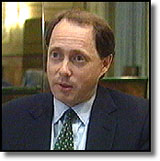
|
Think-Tank Against Income Tax RisesA leading economic think-tank has said that income tax should not have to rise in the forthcoming Labour budget.In their so-called "Green Budget" of recommendations to the Chancellor, the Institute for Fiscal Studies and the investment bank, Goldman Sachs say higher interest rates instead of higher taxes should be used to control the economy. The chief economist of Goldman Sachs, Gavin Davis, said that the public finances are in a much better condition than previously thought. Business groups have been calling on the Chancellor to raise taxes in next month's budget in order to prevent the economy from overheating. The IFS ruled major changes to income tax this year. The Chancellor Gordon Brown has inherited tax rises imposed by the Conservatives that should bring in an extra £24.2 billion a year from the year 2001 onwards. Against that background, the IFS has warned Labour not to make the same mistake as the Conservatives, and put "too much emphasis" on income tax rates.
The study also suggests that the new Government's welfare-to-work plans are unlikely to lead to a big drop in unemployment benefit spending. It says that the policies that Labour could introduce, including benefit reductions, training and financial incentives would not guarantee that any money is saved. The IFS warns that welfare-to-work policies, which Labour has promised will get 250,000 young unemployed back into work and will be paid for by the windfall tax, "may have conflicting effects". Research into the effect of America's work-fare schemes has found evidence of "modest success", according to the IFS. The most effective strategy that new Social Security secretary Harriet Harman could pursue is job-search assistance, the report found. Studies into the effects of such schemes in America has shown they are among the cheapest and most cost-effective ways of getting people back into work, although they benefit the long-term unemployed the least. Bank Calls for End to "Volatile Cycle"
|
Diana, Princess of Wales, 1961-1997
Conference 97
Devolution
The Archive
News |
Issues |
Background |
Parties |
Analysis |
TV/Radio/Web
Interactive |
Forum |
Live |
About This Site
News |
Issues |
Background |
Parties |
Analysis |
TV/Radio/Web
Interactive |
Forum |
Live |
About This Site
© BBC 1997 |
politics97@bbc.co.uk |

